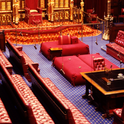Possibly the most fatuous election in British history took place nine years ago. The death of Lord Avebury, a hereditary peer, triggered a pseudo byelection in which no fewer than seven Liberal Democrat noblemen tried their chances at replacing him.
If fox hunting is, in Oscar Wilde’s phrase, the unspeakable in pursuit of the inedible, this was surely the unelectable in pursuit of the indefensible.
Apart from a few tribal councils in the Pacific Islands and maybe Lesotho, it is hard to find any other country in the world that has persisted with the hereditary principle since the Prussian House of Lords was abolished in 1918.
Even the tattered remnants of the Prussian House of Hohenzollern might shake their heads in disbelief that, until 18 months ago, the Brits were still holding elections for the right of the titled classes to place their ancestral bums on the red leather upholstery of the Upper House.
Among those competing to step into Lord Avebury’s shoes was the 13th Earl of Carlisle, who owes his title to a 14th-century military leader. There were distant relatives of a former prime minister, Lloyd George, and a famous philosopher, Bertrand Russell, as well as an actual viscount (Lord Thurso).
There may have been seven candidates, but there were only three voters. Six of the candidates gained no votes at all. And so it was that, on 19th April 2016, Viscount Thurso romped home with all three votes: 100 per cent of the electorate.
Had he noticed, even North Korea’s Kim Jong-un would have looked on in envy.
There was something poignant about the byelection since Lord Avebury himself had consistently campaigned to abolish the Baroque system by which the dynastic legislators—mostly expelled by the Blair government in 1999—are capped at 92 seats in the Upper Chamber.
Blair had intended to sweep away all the hereditaries—it had, indeed, been a manifesto commitment—but was defeated in that ambition by aristocratic turkeys who refused to vote for Christmas. Viscount Cranborne, later Lord Salisbury, implicitly threatened to derail the whole of the Labour government’s legislative programme. Blair blinked.
Cranborne was a chip off the old block, his ancestor, the 4th Marquess of Salisbury, having done his best to stop the rather more sweeping parliamentary reforms in 1911.
Blair’s answer was a fudge: a preposterous plebiscite. Each time one of the nobles peers falls off their noble perch there is a scramble to replace them.
Avebury did his best to scrap the silly by-elections in 2006: he failed. He tried again the following year; he failed again. Lord Steel (David Steel—remember him?) tried a further five times to introduce bills reforming the Lords. Each time he was defeated. There were further attempts to reform the Lords in 2010, 2012, 2015 and 2016: they were all scuppered. And so the show staggers on.
Fast-forward to the present day. Starmer’s government was elected on a manifesto which included a promise to finally end the indefensible idea that our lawmakers can make laws for the rest of us simply by virtue of birth.
What could be more straightforward? And yet, here we are, more than a year into the Starmer government, and a rearguard action is still being fought to confound the manifesto pledge.
The opponents have so far managed to force through an amendment which would abolish the pseudo byelections—but would allow all the current hereditary peers to remain in the House of Lords. They would, in effect, dwindle away—doubtless over several decades.
Among the proposers of this magnificent piece of fudge—passed by 280 votes to 243—was Lord Parkinson, a former special adviser to Theresa May who failed at his assorted attempts to be elected as an MP; and one Lord Guglielmo Verdirame, who was elevated by Liz Truss in 2022. (No, me neither.)
Scan the list of the peers voting for the fudge and—in addition to the hereditaries thrilled at being offered such a last-minute stay of execution—they are assorted faces of now-forgotten people who once graced the House of Commons many years ago. Simon Hoggart, the late Guardian sketch-writer, once invented a parlour game inspired by looking down on their lordships. It was called “You thought they were dead.”
All this was dismaying to the Labour peer, Lord Grocott, who has been campaigning for years for assorted reforms to the Upper House. “It’s a very, very, very important issue,” he told me. “You could never ever have a clearer, simple, manifesto commitment. The electorate gave a huge majority to the government to implement its manifesto. I mean, for the House of Lords to thwart it or delay it would be such an abuse of goodness knows how many conventions.”
Oh, but they haven’t given up trying. Last week, the noble lords and ladies gathered to urge special clemency for two particular hereditary peers—the Earl Marshal, who organises occasions such as state funerals, the state opening of parliament and coronations, and the Lord Great Chamberlain—effectively on the grounds that they were good chaps and it would make their ceremonial lives easier. This was rejected.
On Wednesday this week, they were back at it again. The Middle East may be in turmoil. The Russian-Ukrainian war grinds on. We have a lunatic in the White House. Yet, there were no fewer than 113 speeches on assorted further attempts to amend the simple five-clause bill to ditch the birthright legislators.
First, they tried to make an exception for any current ministers. That took 29 speeches. Then there were 28 speeches on an abstruse point about incapacitated peers. Then, after a further 20 speeches, the Lords passed an amendment to create a kind of “honorary” peerage—a way of recognising distinguished personages without giving them a seat in parliament.
I can’t find a single news outlet that reported this reverse for the government. It’s almost as if no one cares.
After that came 20 speeches on another amendment, which daringly proposed that peers should be obliged to turn up at least once a session (maybe once every six months, in other words). Peers didn’t like the sound to this and voted it down.
Finally, Viscount Thurso—yes, the one who romped him with all three votes nine years ago—proposed term limits (a maximum of 20 years) for future peers. Their lordships didn’t like the sound of that either.
Now we have a game of constitutional ping-pong, in which the amendments may ricochet between elected MPs and unelected peers in a test of strength.
You read these never-ending debates over supposedly reforming the Upper House and it makes you wonder if anything will ever really change. It feels like an elaborate metaphor for broken Britain.
It’s 140-odd years since Gilbert and Sullivan satirised the House of Lords in their opera Iolanthe, in which fairies threaten to overthrow the peerage and replace them with people chosen by competitive examination. “The House of Peers,” sings the Lord Chancellor, “did nothing in particular, and did it very well.”
Or, as Lord Mountararat chants: “We’ve got to keep the status quo / Or down the social sink we go!”
I’m sure it seemed funny back then.











